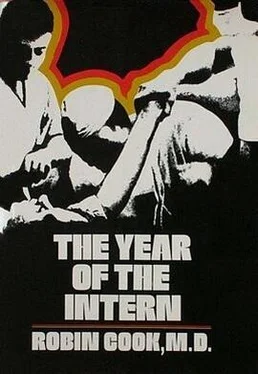“How are you at hitting the heart?” I asked the other intern.
“I’ve hit it one hundred per cent, but only on two tries,” he answered.
“I’m only doing about fifty per cent,” I confessed. After attaching a 10-cc. syringe to the needle, I walked over to the patient and felt for the transverse ridge called the angle of Louis, about midway down the breastbone. This oriented me with respect to the rib cage. It was then a simple matter to find the fourth interspace on the left. The needle went in quite easily, and when I drew back on the plunger the needle filled with blood. Bull’s eye.
“I think my problem has been that I’ve been using the third interspace,” I ventured. I tried it again, this time in the third interspace, and when I withdrew no blood appeared. “That’s it. Okay, you have a go.” I handed him the syringe, and he got the heart right away.
I pulled the endotracheal tube out of the dead man, wiping the rather thick mucus on the tip off onto the sheet, where it left a gray trail. “This guy was really hard to get an endotracheal tube into. Want to try?” Gingerly holding the tube between my thumb and index finger, I advanced it toward the other intern. I was pretty good at entubating now, because I had made it a point over the last few months to practice whenever we had an unsuccessful resuscitation like this one, which happened pretty often. He took the laryngoscope and slipped it in. He said he couldn’t see anything. I looked over his shoulder and could tell he wasn’t lifting enough with the point of the blade. “Lift until you think you’re going to dislocate his jaw.” His arm quivered as he strained. Still something wrong. “Let me try.” I pulled up, and then with my right hand I pushed down on his larynx. The cords came into view. “He has a pretty oblique angle there. Try it again, but push a little on the larynx.” The nurse stuck her head in, saying she needed the ’scope so she could return the crash car to the ER. With a wave of my hand, I staved her off for a few seconds, while I looked over the other intern’s shoulder. A sound of satisfaction came out of him as he finally saw the vocal cords. Then, walking out, he handed the ’scope to the nurse, who clucked in disapproval.
Suddenly I was alone as the activity moved on, like some grim parade, to the living in other parts of the hospital. I wondered again whether to go to Karen’s place or mine. It was a lonely time, especially because the man had died. I had been one of the last people to see him alive. But I had done everything I could — we all had — I guessed we had given it a good try. Besides, it was the Supercharger who had made me take the NG tube out and who had given him some sort of drug. So it wasn’t my fault, though he probably thought it was. No doubt he would blame it on all those expensive tests. That was one of the troubles with the setup for private patients. I was available to see the patient but had no real responsibility, whereas the attending had the ultimate responsibility but was not on the scene. That made my position ambiguous, to say the least. It was too complicated for 4:00 A.M. Still, I was curious about Supercharger’s last injection. The nurse had said it was a sedative. If I went back to look at the chart, I’d have to see the bastard again, and he’d probably have some timely comments about expensive blood counts. But, going up the hall, I decided it was worth the risk.
The Supercharger was gone already. That was a relief; it was also an indication of his interest in teaching. Seconal, the order sheet said. It added nothing to what I knew. Reading through the work-up again, I noted that the man did not have a history of heart trouble. The stomach and kidneys were normal, too. Then I read that the hernia had been a huge, basketball type of problem; yet that didn’t seem to explain his course. Something had made him go into respiratory failure ultimately leading to heart failure. The gastric distention I had relieved must have added to the problem, but it had not caused it. What about the anesthesia? I wondered. Turning to the anesthesia record, I read that it had been pentothal induction, maintenance nitrous oxide, no complications. I vainly struggled to pull in all the loose pieces, but I couldn’t work through the maze. I was too exhausted. Better hurry back to bed, I thought cynically, so as to be there when the operator calls to wake me up for the day. Very funny.
But it was a bad, bad Tuesday night. Tuesday nights were generally active, Like Monday nights, since both Monday and Tuesday always had full operating schedules, and that meant a lot of nighttime dressing, pain, and drain problems; still, I usually got some sleep. Not this time; hardly had I put my head against the pillow when the phone rang again. It was the OR; a case was coming up for amputation, and I was needed to assist.
There was something particularly upsetting to me about an amputation, especially of the leg. An appendectomy or a cholecystectomy or any of the other interior operations left the surface of the person intact. But lifting a foot and a lower leg from the table and carrying them away from the person they belonged to was an irreversible act of alteration. No matter how jaded I became, I was never able to look upon the removal of a human limb as just another medical procedure.
But it had to be done. So I got up again, with the most complete lack of motivation, and dragged myself over to the OR. On with the scrub suit, the hat, and the mask. Once the mask was on, I pulled it down off my face, leaving the strings tied, and studied myself in the mirror. I hardly recognized the wasted man who stared back at me.
Happily, when I got to the operating room proper I found that it was not to be an amputation, after all, but, rather, an attempt to save a leg whose knee had been crushed by a truck. Only the nerve and vein were intact, spanning the gap where the knee had been. The artery, bones — everything else was gone. To my surprise, I found two private surgeons there, both excellent vascular men. I asked if I was needed, since there were two of them, and they answered, “Perhaps.” That left me no choice but to scrub and put on a sterile gown and gloves.
My job was to stand at the end of the table facing the anesthesiologist and hold the foot rigid by cupping my hands together around it. Both surgeons, of course, had to be near my end of the table to work on the knee. But they had their backs to me, as usual — especially the surgeon on my left, who was leaning over the table. I couldn’t see a damn thing. The clock to my right indicated that it was almost 5:00 A.M. by the time the operation really got under way. From their conversation, I gathered that they were putting in a graft for the main artery, which runs down behind the knee toward the foot. An hour passed as slowly as an hour can, the minute hand creeping around the face of the clock. They got the graft in, and a pulse appeared in the foot, only to fade and disappear after a few minutes. That meant the surgeons had to open the graft and take out a fresh blood clot. They got another pulse, which again faded. Another clot. Open again. Clot. This process went on and on and on. I was absolutely amazed by their cool persistence and patience.
With nothing to do and nothing to see except the clock, and standing there motionless with my hands in one position, I began to get uncontrollably sleepy. The sound of the surgeons’ voices wandered in and out of my head, along with the image of the room. Only half-conscious, I fought hard to stay awake, and lost; I fell asleep still holding the foot. I did not fall down. Rather, my head sank slowly until my forehead bumped gently against the shoulder of the surgeon on my left. That brought me awake, so close to the fabric of his gown I could make out the cross weave of individual threads. The surgeon looked around and pushed me back into an upright position with the point of his elbow. Over his mask, cold blue eyes cut at me in clear disapproval. I was beyond caring, but the incident did serve to keep me in the ball game, because it brought back all my pent-up fury.
Читать дальше












